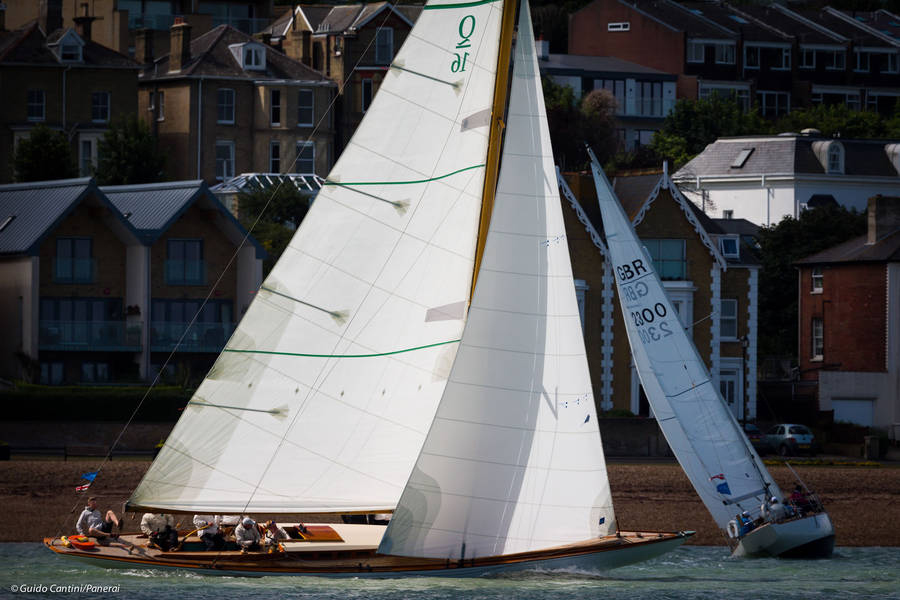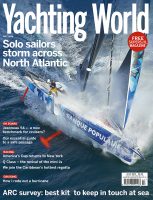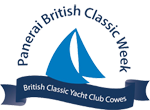
- home

- why q class

- measurement rule

- construction

- designs

- follow the class

- race/cruise gallery

- credits/links/contact

- terms of use
privacy policy

© design & development
strawberry marketing uk ltd

Follow the Class
Q Class features in Yachting World
 The J Class may be the most famous yachts designed to the Universal Rule, but they are by no means the only stunning yachts built to the same formula. Rupert Holmes reports on the embryonic revival of the Q Class.
The J Class may be the most famous yachts designed to the Universal Rule, but they are by no means the only stunning yachts built to the same formula. Rupert Holmes reports on the embryonic revival of the Q Class.Imagine owning a yacht with all the class, style and history of a J Class, but without the monumental costs and logistical challenges. This dream is well on the way to becoming a reality with the resurgence of the Q Class – the purchase and running costs of a Q are a whopping two orders of magnitude less than for the big yachts. Anyone doubting the appeal of the Q Class has only to look at a list of former owners, which features two multiple America’s Cup winners, including Harold S. Vanderbilt in the 1920s and Dennis Conner, who undertook the first first full restoriation of the Q Class yacht...
Read the full article here.
July 2016
Congratulations go to Pascal Oddo’s 1930 Q Class Yacht Jour de Fête!
 Following the launch of the new website to promote the Q Class, which dates back to the Universal Rule of 1904, there was great coincidental success for one of the few original Q Class yachts Jour de Fête.
Following the launch of the new website to promote the Q Class, which dates back to the Universal Rule of 1904, there was great coincidental success for one of the few original Q Class yachts Jour de Fête. This Paine/Burgess designed Q Class yacht was among the international entrants in the 2015 Panerai British Classic Week, sailing with great skill and serenity, finishing first in her class!
Jour de Fête was proud to finish third place overall, taking home both the EFG International Trophy and the Event Trophy for Class 5. On top of this success she also won the Lallow Cup, awarded for the best presented new entrant.
The Universal Rule saw the birth of Class Q. It was the first class to get started, followed by others such as the J, M and R classes. From 1904 until 1937, at least 16 of these boats were built. While originally intended for sailing in the USA and Canada, leading designers worldwide (Charles E. Nicholson, Tore Holm, and Johan Anker) were retained to develop the lines for the Q Class.
After more than 80 years the Q Class design is still proving a high performance winner!
18th August 2015
Q Class Website Launched
As we launch the Q Class website, it is our hope going forward that we will be maintaining not only an informative and fun site, but also a site very much in touch with the new Q Class as it develops. To this end, we also plan to distribute a newsletter which will be a periodic emailing piece, put out whenever there is a major event such as a new regatta to announce or cover, a new boat being finished or a vintage boat being restored, or a major change to the proposed New Universal Rule of Measurement for Class Q.
As soon as we have the necessary background work completed, we will begin inviting readers to sign up for this newsletter. In the interim, please join us in considering venues for racing or cruising in these wonderful boats. Please check back with us soon to get a signup for that newsletter.
Above is a map of the world, showing key locations where some interesting and quality regattas can be held. This represents the opportunity for several, or even a small fleet, of Q boats to get started and race regularly. Given the size of these boats, it may realistically be difficult to regularly go from one major part of the world to another, but it is not at all unreasonable to expect to travel the length or breadth of one of the regions, combining racing and cruising outings as one goes. The map below shows how that might work in one major location, the West Coast of the USA.
In this scenario, we would set up a schedule for races in several of these locations, probably starting at or near the Southern end, then gradually working North as the Spring changes to Summer and weather becomes warmer further North. We could, for instance, schedule four week-long regattas at major racing areas, and then individual owners or small groups could cruise in between regattas, on whatever time is available to each of them, which might vary greatly from one boat to another but would permit all to get good use from their boats.
What we need to do to make this happen is get a group of prospective owners corresponding about doing it, set the stage for the actual planning, and then started on the boats themselves. It will take some time to make it happen, but the key is to get started, which means to build that group of prospective owners, which is what the newsletter will be about.
7th July 2015